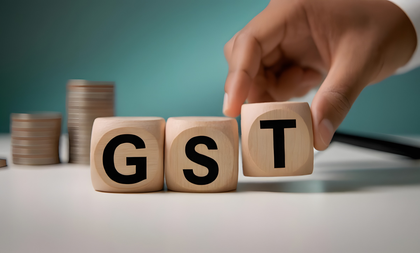GST simplification to lower goods' prices, ease inflation pressure: Report
By IANS | Updated: August 28, 2025 15:20 IST2025-08-28T15:16:43+5:302025-08-28T15:20:26+5:30
New Delhi, Aug 28 The government’s plan to simplify the Goods and Services Tax (GST) structure, replacing the ...

GST simplification to lower goods' prices, ease inflation pressure: Report
New Delhi, Aug 28 The government’s plan to simplify the Goods and Services Tax (GST) structure, replacing the existing four-slab GST system with a simpler two-slab structure, is set to bring considerable relief to the consumers, with lower tax rates expected to make a wide range of goods more affordable, according to a new report.
This move will directly benefit 11.4 per cent of India’s Private Final Consumption Expenditure (PFCE), with taxable consumption estimated at Rs 150-160 lakh crore, Bank of Baroda (BoB) said in its analysis.
The public sector lender expects the changes to add up to Rs 1 lakh crore in additional consumption, boosting GDP by 0.2 to 0.3 per cent in the second half of FY26.
The government would bring the 12 per cent slab to 5 per cent and the 28 per cent slab to 18 per cent, and it will bring effective GST rate on goods and services to ease to 14-15 per cent.
Food items are likely to see the biggest gains, with milk, cheese, oils, sugar, confectionery and processed foods expected to move into the lower tax slab, offering direct savings to households, the report said.
On the non-food side, consumer durables such as air conditioners, televisions, dishwashers and motor vehicles will shift to the reduced 18 per cent rate.
According to the analysis, the changes are expected to revive demand in the durables sector, which has seen growth slow sharply to 2.6 per cent in the first quarter of FY26 from 10.7 per cent a year earlier.
The restructuring will also reduce input costs in industries like construction and manufacturing, where items such as cement, tyres and auto parts are set to attract lower tax rates.
This is expected to have a knock-on effect in the form of cheaper final goods and services, helping contain inflation.
The report estimates that 8.5 per cent of the overall CPI basket will be impacted, while both core and wholesale inflation are likely to moderate as intermediate costs fall.
From a financial perspective, the timing of the GST cuts is seen as significant, coinciding with the Reserve Bank of India’s recent 100-basis-point reduction in the repo rate.
According to the public sector bank, together, the two moves are expected to spur demand for auto loans, personal loans and credit cards, with non-banking finance companies also set to benefit from rising festive season demand.
GST rationalisation as a major consumption booster at a time when global trade tensions and high tariffs from the United States pose challenges for India’s economy, the bank stated.
Disclaimer: This post has been auto-published from an agency feed without any modifications to the text and has not been reviewed by an editor
Open in app